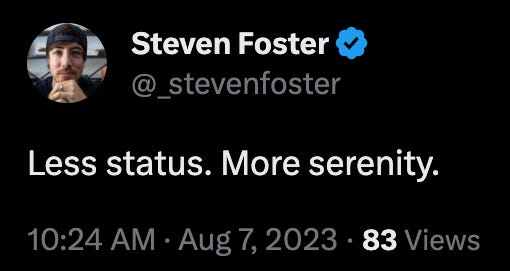The Paradox of Freedom as an Employee Versus Early-Stage Entrepreneur
Reflections from (nearly) two years of solopreneurship & why I'm now looking for a part-time job



I spent the weekend at a music festival with all the makings of a quintessential summer day in Montreal—namely, food trucks and fashion. That’s the thing about festivals, they’re a freedom dome for attendees to let loose. For some, that’s embracing new artists and music or experimenting with different cuisines. For others, it’s rocking a wild or racy outfit, and experimenting with recreational drugs. The contrast was best highlighted during one set when I—aged 33—was sipping Diet Coke as a young couple in front of me—I’d guess around 20—did lines of cocaine off the guy’s phone.
It got me thinking about how “freedom” looks different to different people, and how many people fail to realize this as it pertains to our careers. Here’s a great Tweet that sums up what I mean:
It wasn’t until I struggled as a solopreneur that I fully appreciated Erica’s wisdom. Because the reality is, as an independent worker navigating my second year of self-employment without a team, I’m still:
Making less money than I would be making in a job. And while that’s not the end of the world for everyone, it can be debilitatingly stressful when your expenses are higher and you no longer have benefits. Not to mention, there’s no guarantee you’ll ever hit it big as a creator. You can play the odds and hope for the best. But my advice is to prepare for the worst as well. Because I’ll tell you this transparently: self-employment has at various points pushed me to my lowest points mentally, physically, and financially. And if it weren’t for family and friends supporting me through it all, I would have given up months ago and pursued a full-time role at all costs.
Suffering from decision-making fatigue. One of the best things about being your own boss is also one of the worst things: you make all the decisions. When I moved to London in 2014, I was exposed to a much bigger pool of global companies and high-power CEOs. One thing I remember someone telling me was that a number of these CEOs wore the same outfit every day. They bought them in bulk like a school uniform for the sole benefit of eliminating decision-making around what to wear to work each morning. At first, I thought that was insane and surely didn’t make much of a difference. But having advanced in my career and more recently, hung out my own shingle, I get it now. As much as I love the freedom to choose whether to work from home, a favourite café, or a coworking space, I’ve noticed these daily decisions can stack up fast and exhaust me. So imagine the more pertinent questions of which projects to take on, what clients to pitch and how—the list goes on. (I feel fatigued just thinking of it.)
Navigating good months and bad months. I’ve been managing projects throughout my 10-year career (on top of managing five overseas moves, numerous side projects, and a host of events in my personal life), so I can assure you that creating structure and being adaptable are my strengths. But one thing I still haven’t mastered is creating a pipeline to stabilize the pendulum in the “good months” zone. The difference with having an employer was when a project got delayed, there was always something more pressing for me to take on and my paycheque was never affected. But as a solopreneur, when a project I make room for in my schedule gets delayed—or worse, cancelled—I have to scrounge for something to fill the void (I wrote more about this in a previous newsletter on my biggest rejections and how I grew from them. You can read it here.).
The Paradox of Freedom as an Employee Versus Early-Stage Entrepreneur
Earlier this summer, I caught up with a childhood friend I hadn’t seen in months. Knowing full well that travel has been a big part of my life since our university days when we’d work all year to blow all our cash on summer backpacking trips around Europe, she asked me the obvious question: “You must be travelling a lot now that you’re working remotely for yourself?”
I laughed and sighed in preparation for the disappointing response I offer all those who venture the same guess. I explained that in the past, as an employee, I maximized my time off to travel because I had a steady income to support my adventures and peace of mind about what I was returning to. But as a solopreneur still making less money than I would as an employee and navigating the unpredictability of good months versus bad months, I don’t have the money or peace of mind to go abroad anytime soon.
In other words, I don’t have more freedom over my life as an early-stage solopreneur than I did as an employee. I’ve merely traded the type of freedom I had in the latter for the former. And frankly, I’ve been questioning that choice lately.
Re-examining My Biggest Motivators
My two biggest motivators for becoming a creator/solopreneur have always been:
Freedom. Mainly the freedom to work on projects I enjoy with people I enjoy collaborating with. And a big part of me saw the freedom of working for myself as ideal for the lifestyle I desire. Because in the future when I have kids, I want to have the flexibility to scale back and adapt my schedule to prioritize their care and activities.
The challenge (dare I say “problem”) around this is I still haven’t found a workflow that would offer me this form of freedom, and the reality is I don’t know if I ever will. Getting a job could very well make my life a lot easier in that respect.
Continuous learning. Ever since I was a kid, I’ve loved learning through trial and error. My mom says it began with me mimicking everything my older sister did, from whipping a sippy cup on the floor to drinking from a real cup, teaching myself multiplication, and so on.
I see entrepreneurship as a similar growth curve. I learn from studying people I admire and taking a run at doing what they do in my style. Sometimes I thrive, others I crash and burn. And in the case of the latter, when I’m down to a few measly embers, it can be hard to reignite the fire. But it’s on me to make sure I do. Sometimes I feel like I’m trapped without the resources I’d have as an employee—namely, a boss and teammates to help me find my way.
Clearly, my biggest motivators aren’t perfectly satisfied with my current situation. And from what I gather based on entrepreneurs I know further down the path (I’m talking 5+ years into self-employment), it often takes a minimum of three years to get to a point where you’re mostly satisfied. But it depends on the person, the business, and other variables you deem important to the equation.
Ditching The “All or Nothing” Mindset
A wise friend counselled me recently that my dilemma between whether to keep going as a solopreneur or find a job “doesn’t have to be all or nothing.” She’s right. And I realized I was conflicted about my options because each is too extreme for me at the moment. My ideal situation would be to shoot for the middle of the spectrum by doing two things:
Maintain my solopreneur career part-time. Every time I think about quitting, I think “I didn’t come this far just to come this far.” I’m not ready to close up shop entirely. I just need to cut down my “store” hours and ideally, that’ll be a forcing function to prioritize like hell. So that’s the plan.
Co-create a part-time or fractional role with a great team. One of the main reasons I held off quitting my 9-5 until late 2021 despite wanting to pursue entrepreneurship for years is I was apprehensive about not having colleagues. I’ve always loved being part of a team and I’ve been lucky to work with incredible people over the years, many of which have become good friends. So I knew I would miss the social aspects of being an employee. Initially, I freelanced on projects and courses that provided me with that social engagement but lately, I’ve been doing more solo stuff and I’m missing being part of a team. So I see an opportunity to co-create a part-time or factional role with a great team as a win-win:
The win for them: They’ll get my sharpest, undivided attention because I’m doing half as many hours as I would full-time while making time for creative side projects that will enhance my thinking and performance. Not to mention, they can put me on complex projects they’d typically bring in a freelancer for without the extra work and fees around sourcing a third party for each one. And I’ll get into a groove with the team that will eliminate the need to onboard me for each project.
The win for me: I’ll get to work with people I love collaborating with long-term in lieu of constantly changing clients and adapting to new ways of working. As a result, I’ll establish deeper working relationships that will enhance our project outputs. And it’ll allow me to spend more time working on projects versus looking for them.
Taking Status Out of The Equation
One of my biggest concerns about scaling my solopreneurship back by 50% in order to take on a part-time or fractional role with a team was “What will people think?” At a time when people preach incessantly about leaving the corporate world to pursue self-employment and “never look back,” I worried people would deem me a failure.
But a fantastic mentor of mine, Terri Lonier, the very businesswoman and author who coined the term “solopreneur” in the ‘90s (and creator of the Working Solo Newsletter) offered me this wisdom that I’m keen to share with you:
“Solopreneurship is not only a business model, it’s also a lifestyle. You can transition in and out of it throughout your career. You’ve now laid the foundation for working on your own. So if you decide to leave a job or get laid off in the future, you’ll have the confidence and competency to land on your feet.”
If I take the question of “What will it look like to others?” out of the equation, I immediately feel a sense of optimism about co-creating a role with a great team. The alternative would be to continue working in isolation when that’s not enjoyable to me. This Tweet by one of my favourite creators, Steven Foster, sums up my mindset:
I want to maximize serenity and minimize stress, chaos, and grinding. Circling back to Erica’s Tweet earlier—on how she’s shifted between self-employment and being an employee throughout her career and now has both a great job and interesting side projects that offer her complementary types of freedom—I could see myself enjoying a similar dynamic. So that’s what I’m shooting for, a 50/50 split between entrepreneurship and employment.
A Question For You
Now, I’ve shared a lot about what’s going on in my head and I’d love to shift gears for a moment to get your input on my next move. Ever since my first internship and post-university job, I’ve made it a priority to co-create win-win roles with teams and organizations I wanted to work with. In most cases, there was no job listing but I managed to co-create roles by pitching myself to founders and CEOs who happened to have important, non-urgent projects on their mind that they needed a Swiss Army knife worker to tackle before they became urgent. And now as I formulate a list of companies I’d love to work for, I’d love your input.
I’d love to know what companies you think are the best in the business and could possibly be a good match for me (i.e., they might be worth looking into as potential employers to pitch myself to—even if they don’t have any openings posted).
Here are the types of roles I’m looking for to make this more concrete:
Creating online courses, workshops & educational content for customers or employees in need of training. This includes both live courses and self-paced models.
Project management for special projects (i.e., important, non-urgent projects founders or CEOs need to deploy but keep putting on the back burner). Here are some examples of projects I’ve done in the past:
Helping managers and founders optimize their customer delivery process by mapping out the process, identifying pain points, and making changes.
Facilitating transition (of company info/records, processes, and systems) during an acquisition.
Event planning for conferences and team offsites designed to facilitate training and team building.
Etc.
Thank you in advance for any recommendations and have a wonderful week,
P.S. Despite all the music I heard at OSHEAGA last weekend, the song that’s been stuck in my head was the one I heard on the metro ride home. Picture this: roughly 54,000 people flooded the station when the festival closed around 11 pm. It was the most packed I’ve ever seen and while you’d expect it to be a zoo navigating the tunnels, the crowd moved in an orderly fashion with everyone singing in unison as a Beatles busker lead the chorus of Come Together. It was epically cool with the underground acoustics and sea of people in perfect harmony.
I got to thinking about the line preceding the chorus (the first line below) and how ultimately, we all need to feel a sense of freedom to be happy. But it’s up to you to decide what that looks like.
Come Together lyrics:
“One thing I can tell you is you got to be free,
Come together, right now,
Over me.”
P.P.S. Speaking of The Beatles, here’s a throwback to May 2015 when I botched what would have been an epic Abbey Road shot with my mom, aunt, and sister. They like to joke I was attempting a getaway on the motorcycle behind me after touring them around London and Paris for two weeks (I was a proper Londoner back then—and in my heart, I always will be).
⏩ If you want to help me promote my newsletter, share this one with friends.
💻 If you want to build a cohort-based course, join my Course + Community of Practice.
☕ If you want to grab coffee in Montreal, hit reply to let me know when you’re in town.








Alexandra what a piece! Similar to Paul, my transition to "full-time" creator was a jumble of consulting and working for friends. One of the ideas that helped me was telling myself I was building a portfolio. While photographing friends who weren't in my line of work or consulting for another friends crypto currency company, I was building the portfolio I needed build to get where I wanted to be.
Part of the reason I didn't go back to corporate life is that I wanted to do more than one thing. Adding a job to your portfolio of experience and income sounds like a win to me. Be on the look out for how your value is exponentially amplified across your personal portfolio. Much like how Elon Musk was able to use Space X technology to make Tesla's cars better, or how Steve Jobs made sure the Pixar team was able to use Apple Computers to make movies, you're going to have a whole new force multiplier in your expertise.
I know many opportunities will come your way and whatever you add to the mix will be a positive, transformative, and valuable experience for everyone involved.
Love this reflection! I notice a lot of people feel the pressure to be all or nothing solo. For me I couldn’t have really done it without consulting which is like a pseudo part time job (I just took breaks between gigs) and I’m still doing a little. This year is probably the first year I can say I can cover my cost of living from the work I really want to be doing. I can tell from this reflection though you’re on to something special. Thanks for sharing. Definitely will point people to this.